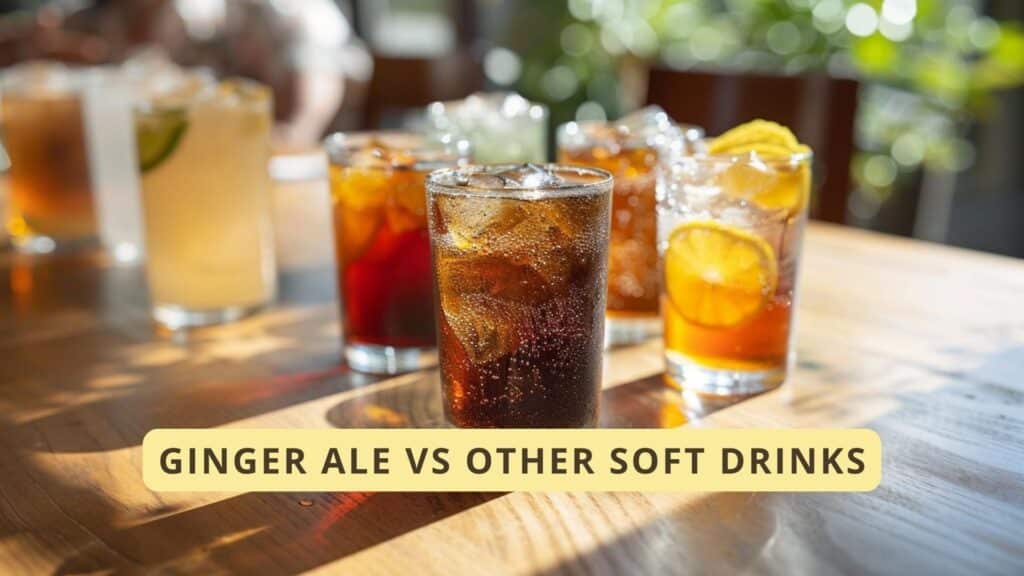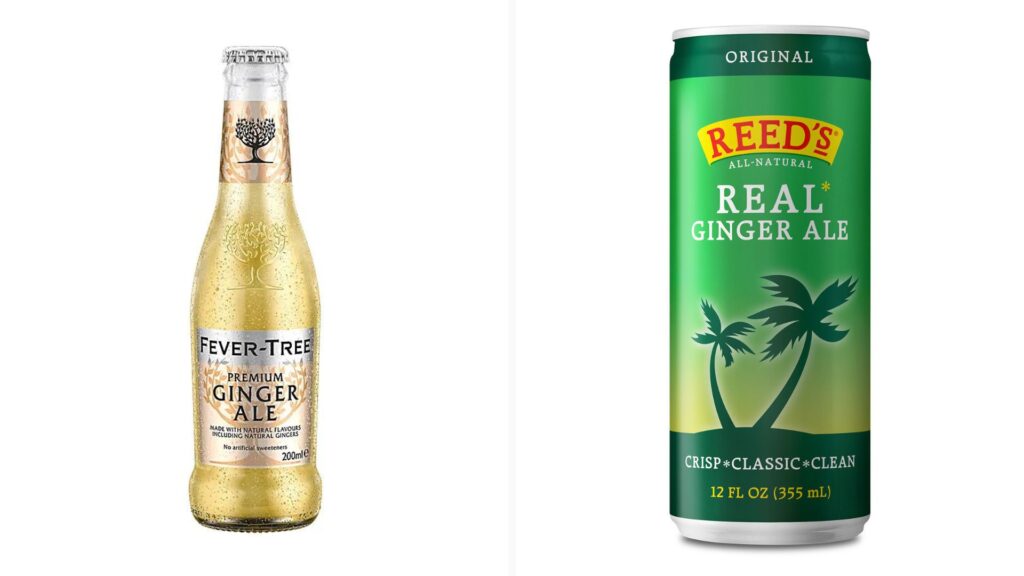Have you ever wondered if your favorite ginger ale contains caffeine? You’re not alone.
Many people are curious about the ingredients in this popular beverage.
While ginger ale is often enjoyed for its unique taste and potential health benefits, caffeine could be a concern for some.
This article will explore the truth about ginger ale and its caffeine content.
We’ll examine various brands and types of ginger ale to help you make informed choices about your beverage consumption.
Keep reading to discover whether your go-to ginger ale contains caffeine, and learn more about the potential effects of this beloved drink on your well-being.
What is Ginger Ale?
Ginger ale is a carbonated soft drink known for its distinct ginger flavor. This beverage is enjoyed by many people around the world due to its refreshing taste and versatility.
Components and Variations of Ginger Ale
- Main Ingredients: Traditional ginger ale is made with carbonated water, sugar or high-fructose corn syrup, and ginger flavoring. The ginger flavoring can come from natural ginger root extract or artificial sources.
- Variations in Flavor: Some brands use real ginger root to create a more authentic and spicy flavor, while others rely on artificial ginger flavoring for a milder taste. The amount of ginger used can also vary between brands, resulting in different levels of spiciness and intensity.
- Diet and Regular Forms: Ginger ale is available in both regular and diet forms. Regular ginger ale contains sugar or high-fructose corn syrup, while diet versions use artificial sweeteners to reduce the calorie content. This allows people with different dietary preferences to enjoy this beverage.
Uncovering the Caffeine Content in Ginger Ale
Caffeine-Free Norm in Ginger Ale
Most ginger ale brands available on the market do not contain caffeine, which aligns with consumer expectations of a non-caffeinated soft drink.
This makes ginger ale an appealing choice for those looking to avoid stimulants or enjoy a refreshing beverage without the added effects of caffeine.
Some Notable Exceptions
While the majority of ginger ale brands are caffeine-free, there are a few exceptions. One such example is Bawls Ginger Ale, which contains caffeine.
The inclusion of caffeine in these products may be due to various reasons, such as enhancing the taste, providing an energy boost, or creating a unique product that stands out in the market.
Positioning of Ginger Ale Among Other Soft Drinks

In the broader soft drink market, ginger ale is often positioned as a non-caffeinated alternative to popular caffeinated beverages like cola or energy drinks.
Consumer perceptions and misconceptions about the caffeine content in soft drinks can vary, with some individuals assuming that all sodas contain caffeine.
However, ginger ale serves as a key example of a widely consumed soft drink that is typically caffeine-free.
As consumer preferences shift towards healthier and less stimulating beverage options, the demand for caffeine-free drinks like ginger ale is likely to grow.
Market trends suggest that more people are opting for alternatives to traditional caffeinated soft drinks, and ginger ale is well-positioned to benefit from this shift in consumer behavior.
Nutritional Content of Commercial Ginger Ale
Ginger ale, like many other carbonated soft drinks, is primarily composed of water, sugar or high-fructose corn syrup, and ginger flavoring.
A typical serving of ginger ale contains around 140 calories and 36 grams of carbohydrates, most of which come from added sugars.
Ginger ale generally does not contain any significant amounts of protein or fat, making it mainly a source of quick energy through sugars.
Here’s the table showing the nutritional content of ginger ale, specifically referencing a 12-ounce serving of Canada Dry Ginger Ale:
| Nutrient | Amount |
|---|---|
| Total Fat | 0g |
| Sodium | 50mg |
| Total Carbohydrates | 36g |
| Protein | 0g |
| Calories | 140 |

Medicinal Properties of Ginger Ale
One of the most commonly cited medicinal benefits of ginger ale is its potential to alleviate nausea and settle an upset stomach.
Ginger has been traditionally used as a home remedy for motion sickness, morning sickness during pregnancy, and general digestive discomfort.
Some studies suggest that the ginger extract found in certain ginger ales may help reduce nausea symptoms, although the effectiveness can vary depending on the concentration of real ginger in the beverage.
Benefits from Real Ginger Content
It’s important to note that not all ginger ales are created equal when it comes to their ginger content.
Some brands use real ginger extract in their recipes, while others rely on artificial ginger flavoring.
Ginger ales made with real ginger may offer additional health benefits, such as anti-inflammatory properties and digestive support, thanks to the presence of natural compounds like gingerols and shogaols found in ginger root.
Potential Downsides of Consuming Ginger Ale
High Sugar Content
One of the main concerns with regular ginger ale consumption is its high sugar content.
Many brands contain a significant amount of added sugars, which can contribute to various health issues when consumed in excess.
Regularly drinking sugary beverages like ginger ale has been linked to an increased risk of obesity, type 2 diabetes, and other metabolic disorders.
It’s important to consider the sugar content of ginger ale in relation to other sweetened drinks and to consume it in moderation as part of a balanced diet.
Artificial Sweeteners in Diet Variants
Diet versions of ginger ale often replace sugar with artificial sweeteners to reduce calorie content.
While these sugar substitutes are generally considered safe, some studies suggest that they may have potential health implications.
Consuming artificial sweeteners has been associated with increased appetite, disruption of gut bacteria balance, and metabolic disturbances in some individuals.
However, more research is needed to fully understand the long-term effects of artificial sweeteners on health.
Common Side Effects
Like other carbonated beverages, ginger ale may cause some common side effects in certain individuals.
The carbonation in ginger ale can lead to bloating, gassiness, and discomfort, especially when consumed in large quantities.
Additionally, the high sugar content and artificial sweeteners in some ginger ales may exacerbate symptoms of irritable bowel syndrome (IBS) or other digestive sensitivities.
People with specific health concerns or sensitivities should be mindful of their ginger ale intake and consult with a healthcare professional if needed.
Choosing a Healthier Ginger Ale: Factors to Consider
Sugar Content and Sweeteners
It’s essential to compare the sugar content of different ginger ale brands and opt for those with lower amounts.
Ginger ales may be sweetened with various types of sugars or sweeteners, each with its own health implications.
Drawbacks of Different Sweetners Used in Ginger Ale
Natural sugars, like cane sugar or honey, are less processed but still contribute to overall sugar intake.
High-fructose corn syrup, a common sweetener in soft drinks, has been linked to increased risk of metabolic disorders.
Artificial sweeteners, such as aspartame or sucralose, provide sweetness without calories but may have potential negative effects on gut health and appetite regulation.
Natural vs. Artificial Ingredients
When choosing a ginger ale, look for brands that use real ginger extract rather than artificial ginger flavoring.
Ginger ales made with authentic ginger may offer more of the potential health benefits associated with ginger root, such as anti-inflammatory and digestive-supportive properties.
In addition to the ginger content, consider the presence of other natural ingredients versus synthetic additives.
Some ginger ales may contain preservatives, like sodium benzoate or potassium sorbate, and artificial coloring agents.
Opting for brands with simpler, more natural ingredient lists can be a healthier choice.
Product Recommendations for Healthier Ginger Ale Options

When browsing ginger ale options, look for labels that indicate the use of real ginger, such as “made with real ginger” or “contains ginger extract.”
Brands that prioritize natural ingredients over artificial additives are generally better choices.
Some brands known for their healthier ginger ale options include Reed’s Ginger Ale and Fever-Tree Ginger Ale, which use real ginger and have lower sugar content compared to mainstream brands.
Practical Tips for Consumption
To enjoy ginger ale as part of a healthy diet, consider the following tips:
- Moderation: Treat ginger ale as an occasional beverage rather than a daily staple. Limit your intake to 1-2 servings per week, and opt for smaller serving sizes when possible.
- Dilution: Dilute ginger ale with water or ice to reduce the sugar and calorie content per serving while still enjoying the flavor.
- Pairing: When consuming ginger ale, pair it with healthier food choices like fruits, vegetables, or lean proteins to help balance the overall nutritional value of your meal or snack.
- Timing: If you’re relying on ginger ale to help alleviate nausea or settle an upset stomach, consume it in moderation and only as needed. Regular consumption of sugary drinks, even for medicinal purposes, can still have negative health impacts.
Brief History of Ginger Ale
Origins of Ginger Ale
- Transition from Ginger Beer to Ginger Ale: Ginger ale evolved from ginger beer, a more robust and older beverage that originated in England. Ginger beer has a stronger ginger flavor and is typically brewed with natural ginger root, while ginger ale has a milder taste and is carbonated.
- First Commercial Production: The first commercial production of ginger ale began in the mid-19th century in Ireland and England. These early versions were darker in color and cloudier than the ginger ale we know today.
Commercial Development
- Innovation in Canada: In 1907, John McLaughlin, a Canadian pharmacist, invented Canada Dry Ginger Ale in Toronto. This brand became a global success and set the standard for the modern ginger ale we’re familiar with today.
- Modern Popularity: Over the years, the formula for ginger ale has been refined, resulting in a clearer, milder beverage that contrasts with the traditional darker and spicier styles. This evolution has contributed to the widespread popularity of ginger ale.
Uses and Popular Combinations of Ginger Ale
1. Culinary Uses
Ginger ale is a versatile drink that can be enjoyed on its own or used as an ingredient in various culinary preparations.
It’s often used as a mixer in popular cocktails and mixed drinks, such as a whiskey ginger, which combines ginger ale with whiskey, or a Moscow Mule, which features ginger ale, vodka, and lime juice.
2. Medicinal Uses
In addition to its culinary uses, ginger ale has been traditionally used in North America as a home remedy for settling an upset stomach and easing nausea.
Many people find that sipping on ginger ale can help alleviate digestive discomfort, making it a popular choice during times of illness.
Conclusion
In conclusion, understanding the caffeine content in ginger ale is essential for making informed choices about your beverage consumption.
While most ginger ales are caffeine-free, there are notable exceptions, and it’s crucial to check labels carefully.
When choosing a ginger ale, consider factors such as sugar content, natural ingredients, and potential health implications.
By opting for brands that use real ginger and have lower sugar content, you can enjoy the potential benefits of ginger ale while minimizing the negative health impacts.
Remember to consume ginger ale in moderation and pair it with a balanced diet and lifestyle.
So, the next time you reach for a refreshing ginger ale, take a moment to consider your choice and its impact on your well-being. Your health will thank you for it!




